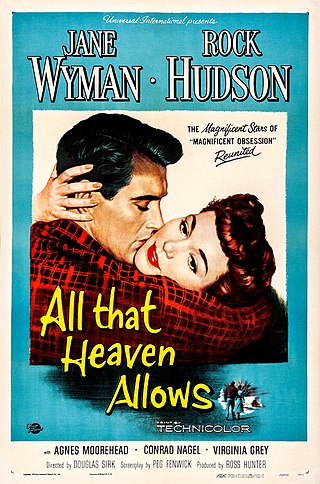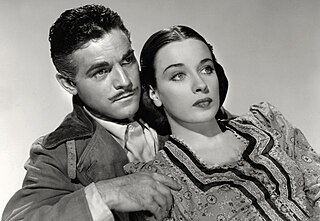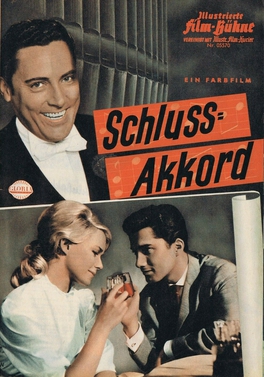
All That Heaven Allows is a 1955 American drama romance film directed by Douglas Sirk, produced by Ross Hunter, and adapted by Peg Fenwick from a novel by Edna L. Lee and Harry Lee. It stars Jane Wyman and Rock Hudson in a tale about the social complications that arise following the development of a romance between a well-to-do widow and a younger man, who owns a tree nursery. In 1995, the film was selected for preservation in the United States National Film Registry.

Douglas Sirk was a German film director best known for his work in Hollywood melodramas of the 1950s. However, he also directed comedies, westerns, and war films. Sirk started his career in Germany as a stage and screen director, but he left for Hollywood in 1937 after his Jewish wife was persecuted by the Nazis.

Written on the Wind is a 1956 American Southern Gothic melodrama film directed by Douglas Sirk and starring Rock Hudson, Lauren Bacall, Robert Stack, and Dorothy Malone. It follows the dysfunctional family members of a Texas oil dynasty, including the complicated relationships among its alcoholic heir: his wife, a former secretary for the family company, his childhood best friend, and his ruthless, self-destructive sister.

Susanna "Susan" Kohner is an American actress who worked in film and television. She played Sarah Jane, a young African-American woman, in Imitation of Life (1959), for which she was nominated for an Oscar as Best Supporting Actress. She won two Golden Globe awards for her performance.

Imitation of Life (1959) is an American drama film directed by Douglas Sirk, produced by Ross Hunter and released by Universal International. It was Sirk's final Hollywood film and dealt with issues of race, class and gender. Imitation of Life is the second film adaptation of Fannie Hurst's 1933 novel of the same name. The first, directed by John M. Stahl, was released in 1934. The film's top-billed stars are Lana Turner and John Gavin.

The Tarnished Angels is a 1957 black-and-white American CinemaScope drama film directed by Douglas Sirk and starring Rock Hudson, Robert Stack, Dorothy Malone, Jack Carson, and Robert Middleton. The screenplay by George Zuckerman is based on the 1935 novel Pylon by William Faulkner.

Sleep, My Love is a 1948 American noir film directed by Douglas Sirk. It features Claudette Colbert, Robert Cummings and Don Ameche.
Battle Hymn may refer to:
't Was één April is a 1936 Dutch film directed by Douglas Sirk and Jacques van Tol. It is a lost film.
Seymour Nebenzal was an American-born Jewish-German film producer. He produced 46 films between 1927 and 1961.

Hitler's Madman is a 1943 World War II drama directed by Douglas Sirk. It is a fictionalized account of the 1942 assassination of Nazi official Reinhard Heydrich and the resulting Lidice massacre, which the Germans committed as revenge. The film stars Patricia Morison and Alan Curtis and features John Carradine as Reinhard Heydrich. Sirk intended the film to function more as a documentary, but after Louis B. Mayer acquired the film in February 1943, he required reshoots to increase the drama. According to TCM, “Added material included Heydrich's deathbed scene with "Himmler" and university scenes featuring M-G-M starlets, including Ava Gardner.”
The Girl from the Marsh Croft may refer to:

Schlußakkord is a German film melodrama of the Nazi period, the first melodrama directed by Detlef Sierck, who later had a career in Hollywood as Douglas Sirk and specialised in melodramas. It was made under contract for Universum Film AG (UFA), stars Lil Dagover and Willy Birgel and also features Maria von Tasnady, and premièred in 1936. It shows stylistic features later developed by Sierck/Sirk and makes symbolic and thematic use of music.

The First Legion is a 1951 American drama film directed by Douglas Sirk and written by Emmet Lavery. The film stars Charles Boyer, William Demarest, Lyle Bettger, Walter Hampden, Barbara Rush, Wesley Addy, H. B. Warner and Leo G. Carroll. The film was released on April 27, 1951, by United Artists. The film was based on Lavery's play of the same name, which opened on Broadway at the 46th Street Theatre on October 1, 1934. The play, which had no female characters, moved to the Biltmore Theater where it closed January 5, 1935.

Slightly French is a 1949 American musical comedy film directed by Douglas Sirk and starring Dorothy Lamour, Don Ameche and Janis Carter. The screenplay concerns a Hollywood director who recruits an American singer.

"Hvala, ne!" is a song performed by Slovenian singer Lea Sirk. The song was released as a digital download on 2 March 2018. The song was written and produced by Lea Sirk and Tomy DeClerque.

Final Accord or Final Chord is a 1960 drama film directed by Wolfgang Liebeneiner and starring Christian Marquand, Eleonora Rossi Drago and Viktor de Kowa. It was made as a co-production between France, Italy and West Germany. It is a remake of the 1936 film of the same title by Douglas Sirk.

Final Accord is a 1938 French-Swiss musical comedy film directed by Douglas Sirk and Ignacy Rosenkranz and starring Käthe von Nagy, Jules Berry and George Rigaud. It was shot at the Epinay Studios in Paris and on location around Montreux in Switzerland. The film's sets were designed by the art director Jacques Krauss.













